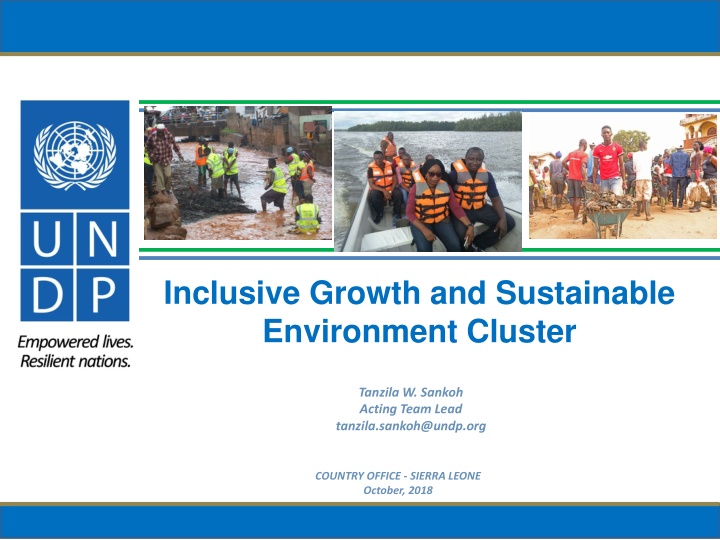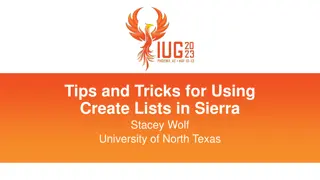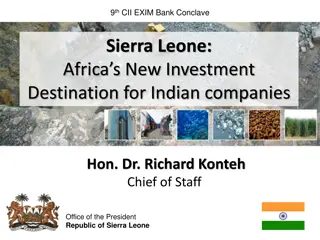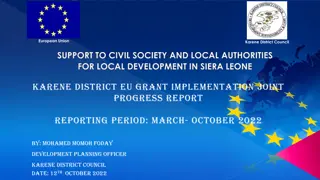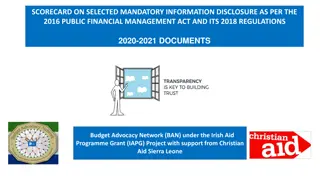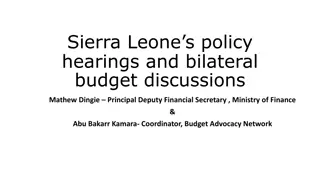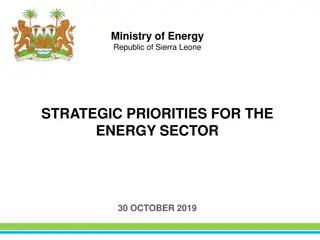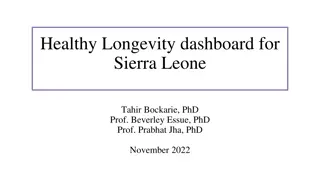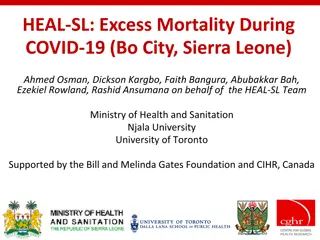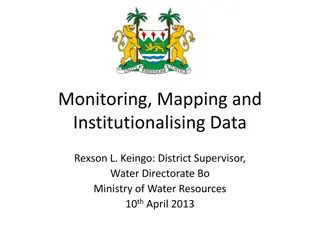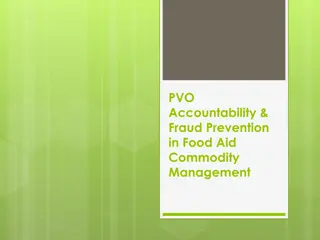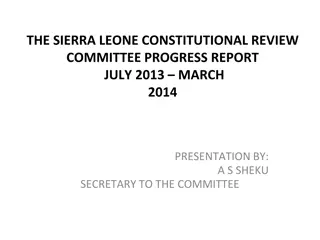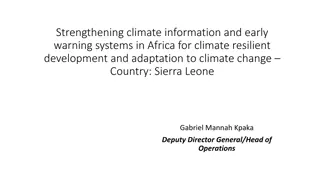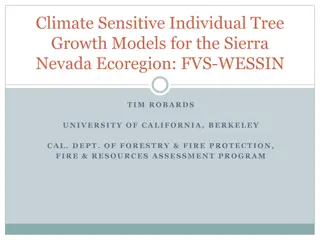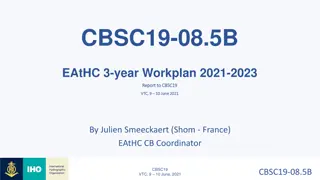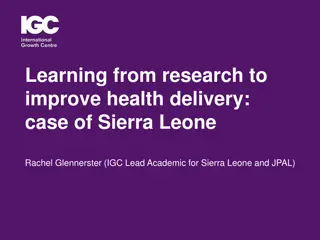Enhancing Inclusive Growth and Environmental Sustainability in Sierra Leone
Sierra Leone, with abundant natural resources, faces economic and social challenges, high youth population, extreme poverty, and climate change vulnerabilities. The Inclusive Growth and Sustainable Environment Cluster aims to promote natural resource governance for economic growth while preserving the environment. Current projects, like the Charcoal Utilization Project, focus on reducing Greenhouse Gas emissions through sustainable biomass energy utilization. Efforts include strengthening policy frameworks and institutional support for energy efficiency and biomass energy businesses.
Download Presentation

Please find below an Image/Link to download the presentation.
The content on the website is provided AS IS for your information and personal use only. It may not be sold, licensed, or shared on other websites without obtaining consent from the author.If you encounter any issues during the download, it is possible that the publisher has removed the file from their server.
You are allowed to download the files provided on this website for personal or commercial use, subject to the condition that they are used lawfully. All files are the property of their respective owners.
The content on the website is provided AS IS for your information and personal use only. It may not be sold, licensed, or shared on other websites without obtaining consent from the author.
E N D
Presentation Transcript
Inclusive Growth and Sustainable Environment Cluster Tanzila W. Sankoh Acting Team Lead tanzila.sankoh@undp.org COUNTRY OFFICE - SIERRA LEONE October, 2018
Sierra Leone is endowed with natural resources that can be used for the benefit of all. The vast majority of people rely on natural resources for their livelihoods but these face a host of different pressures including internal and external shocks. High youth population confronted with series of economic and social challenges and high incidences of extreme poverty. Highly vulnerable to climate change and disasters, with weak institutional capacities. To address these vulnerabilities and foster inclusive growth and resilience the IGSE cluster has a vision which is geared towards addressing the above mentioned challenges. The Sierra Leone Context
Inclusive Growth and Sustainable Environment (IGSE)Cluster. VISION: To supports natural resource/environmental governance for all Sierra Leoneans to participate and benefit from economic growth while preserving its natural capital for long-term development
Inclusive Growth and Sustainable Environment (IGSE)Cluster. RELEVANCE: Draft National Development Plan: Cluster 5: Empowering Women, Children and Persons with disabilities; Cluster 6: Youth Employment and Cluster 7 Addressing Vulnerabilities and Building Resilience Contributes to the achievement of 15 of the Sustainable Development Goals (SDGs).
Current GEF Funded Projects Project 1:Efficient Energy Production and Utilization of Charcoal. Objective: The project seeks the reduction of Green House Gas [GHG] emissions in the rural household and industrial sectors of Sierra Leone through integrated and sustainable biomass resource production and utilization, and promotion of sustainable biomass energy technologies in Sierra Leone using market based approaches. Project Budget: 1,968,000 USD Project Duration: 3 years (2019 end of project) Project Location: Sierra Leone Executing Agency: Ministry of Energy Implementation Modality: Direct Implementation Modality.
COOKSTOVE PROJECT STATUS Output1: Strengthening policy and institutional frameworks for the deployment of energy efficiency and biomass energy businesses. Result The Ministry of energy was supported to harmonization and update of the national energy policy and development of the renewable and energy efficiency policies. Output 2: Improved, more efficient production and efficient utilization of certified charcoal and cookstove Result Established 40 hectares of community-based forest in Port Loko and Moyamba district for the production of certified charcoal as affordable, sustainable, renewable energy sources. 100 cookstoves in the four regions were identify and train in cookstove fabrication, production and maintenance in the four regions of the country Conduct Gender audit and training The recruitment of Financial Engineering Expert provided support in the establishment of procedures and implementing arrangements of the grant which will facilitate an increased number of investments in improved, more efficient charcoal and improved cookstove production. Output 3: Development of public-private initiatives for the improved and more efficient production of charcoal and the scaling up of improved cookstove production Key Outstanding activities Establishment of Grant/Rebate scheme for increased production of improved cookstoves to increase the number of poor households using improved cook stoves. Maintenance of the 40 hectares of woodlot. Complete the rehabilitation and installation of a standard laboratory equipment to the Renewable Energy Center to act as a one-stop center and the Center of Excellence to provide an integrated set of information and coordination services to the value chain actors and stakeholders in the biomass sector.
Current GEF Funded Projects Project 5:Adaptive Water Security Project. Objective: To enhance the adaptive capacity of decision-makers in the public and private sector involved in water provision to plan for and respond to climate change risks on water resources. Project Budget: 3,090,000 USD Project Location: Freetown, Kono, Kambia and Pujehun Project Duration: 3 years (2019 is the last year of implementation) Status: Project implementation has been slow over the years due to the challenges in the sourcing of technical expertise for the establishment of innovative Water supply systems therefore a no cost extension for 6 months was requested and granted for an efficient completion and reporting on the project. A mid term Evaluation was also conducted and it is at its final stages of completion. Executing Agency: Ministry of Water Resources. Implementation Modality: National Implementation Modality.
WATER PROJECT STATUS Output 1 More than 50 officers from the Ministry of Water Resources, esp. the Water Policy Planning Coordinating Unit (WPPCU), the Sierra Leone Environmental Protection Agency (EPA) and Districts leaders provided with relevant climate risks management guidelines/tools and trained on how the results of the climate risk/vulnerability assessments should be used to adjust regulations and policies governing the water sector at national (NWSP, RWSS) and local level (Districts development plans) Result Climate change resilience plan and emergency contingency plan for the Guma Reservoir Baseline water point mapping climate change risk management tools and guidelines for integration into water policies and stakeholders trained A climate change resilience plan has been developed for the Guma Valley Reservoir, resulting in increased understanding of climate change-related issues that can affect water supply in Freetown as such a contingency plan has been developed. Supported the annual WASH sector review conference participated in by the Sierra Leone Business forum and wash donors. The staff of the ministry of Water Resources have been funded for a number of trainings e.g on water quality, hydrological monitoring etc Output 2: Pilot demonstrations of innovative climate resilient rainwater collection in at least 3 public building with reservoirs established to support the bottleneck of drink water supply in the dry season Result Constructed one rooftop rainwater collection system with 10,000 litres of reservoir at the Freetown Teachers Training College- ongoing Two (2) spring boxes one in Mayenkeni and one at the Back of American Embassy, IMATT- ongoing
WATER PROJECT STATUS Output 2 Result Continue Installed Solar Panels, Inverter/Charge controller, Lightning Arrester and maintenance service at the Water Directorate of the Ministry of Water Resources-ongoing Constructed 1 solar powered boreholes at Tree Planting- ongoing Constructed three (03) Spring Boxes with distribution network of maximum 350m and eight (08) taps per spring box; 1 in Kambia; 1 in Kono and 1 in Pujehun- ongoing Rehabilitated One (01) Gravity Water System with distribution network of maximum 350m and eight (08) taps in Kono; ongoing Constructed one (01) Rain Water Harvesting facilities, 6m storage tanks and distribution network of maximum 250m; 3 in Freetown and 1 in Pujehun- ongoing Constructed Twelve (12) boreholes equipped with solar powered boreholes and (4 No 5m3) elevated Poly storage tanks in communities in Freetown (4), Kambia (2), Pujehun (4) and Kono (2)- ongoing Key Outstanding activities Relevant experiences/lessons from community oriented climate resilient water infrastructure and management practices (including gender differentiated issues) identified, and widely shared/disseminated to facilitate replication in other vulnerable areas Regular dialogues established between parliamentarians, local council members, traditional authorities, NGOs/CBOs, and private sector (WASH committees) on the impacts of climate change on water supply in Pujehun, Kambia and Kono districts At least two dialogues under the Sierra Leone Business Forum and WASH Donors Investment Platform initiated on managing climate change risks on water provision and usage
CURRENT GEF FUNDED PROJECTS Project 6: Adapting to Climate Change Induced Coastal Risks management in Sierra Leone. Objective: To strengthen the ability of coastal communities to systematically manage climate change risks and impacts on physical infrastructures and economic livelihoods. Project budget: 10,165,000 Project Location: Hamilton, Lakka, Tombo, Conakry Dee, Shenge and Turtle Island. Project Duration: Five years started mid last year Status: Project implementation started on time, all national staff have been recruited and project implementation will start in full swing this year Executing Agency: Ministry of Water resources. Implementation Modality: National Implementation Modality.
Project Objective Project Objective Strengthen communities to systematically manage climate change risks and impacts on physical infrastructure livelihoods the ability of coastal and economic Duration: 5-year project (April 2018 March 2023) Estimated budget: $ 10,165,000 USD 2018 budget: $ 3,204,607 Project Locations: Hamilton. Lakka, Conacry Dee, Tombo, Shenge & Tutle Island
Project Organization Structure Project Board Executive: UNDP Senior Beneficiary: EPA-SL, USL-IMBO, GEO DEPT, MFMR, NTB, Local Communities, Municipal Authorities Senior Supplier: UNDP-GEF Project Technical Committee Project Steering Committee Project Coordinating Unit Project Manager, M&E, CTA, Finance & Admin, Driver Project Assurance UNDP CO UNDP-GEF TEAM A TEAM B EPA -SL TEAM C MFMR & NTB USL-IBMO
Project Background High vulnerable of the coastal zone to climate change impacts Limited (and dispersed) information and knowledge management Inadequate institutional and policy capacities for ICZM Lack of awareness on coastal risks along the coast Inadequate resources and financial constraints Socio-economic factors Population and Poverty Need for climate resilience livelihood options
Component 1: Generating sound scientific knowledge and access to information Component 2: Climate information internalized into coastal development policy and plans Component 3: Awareness and alternative, innovative activities to support adaptation in the coastal zone
OUTCOME 1. Enhanced availability of high quality climate risk information that is critical for development decision-making in the coastal zone Output 1.1: Climate and oceanographic monitoring network (with 6 automated oceanographic monitoring systems) and related data processing systems installed along the coastal zone to improve the knowledge base for measuring future climate induced risks Outcome Outputs Output 1.2: Institutional capacity of MFMR, EPA-SL, SLMD/A, ONS, SLMQ and USL-IMBO for assessing coastal hazard risk and vulnerability to climate change through probabilistic modelling is strengthened Output 1.4: The human capacity of the MFMR, EPA-SL, MLGRD is strengthened, skilled and trained on CVA techniques Output 1.3: A systematical link between the collected data and the existing CIDMEWS (web based GIS) is established Outputs
OUTCOME 2. Appropriate protection measures, policy, budgeting and legal tools and integrated coordination mechanisms developed to improve and support policy design and implementation in dealing with current and long-term coastal challenges. Outcome Output 2.1: Sea Level Rise and coastal erosion profiles developed for the six target pilot sites to support the strengthening of Coastal Zone Management Plans at both urban and district levels Outputs Output 2.2: Ecosystem based adaptation design guidance to support future climate resilient planning and development in place Output 2.3: Marine spatial plan framework to compliment with ICZM is developed Output 2.4: Sierra Leone ICZM is strengthened with the establishment of SL-ICZM-WG and sustainability mechanisms. Outputs
OUTCOME 3. Public awareness enhanced and climate resilient alternatives to sand mining promoted for better adhesion of policy makers and communities on adaptation Output 3.1: An outreach communication, information and awareness strategy designed and implemented to enhance decision-making and foster public awareness and safety about the potential impacts of climate change Outcome Outputs Output 3.2: Adaptation strategies for alternative livelihoods are designed to strengthen women and sand miner youth association s resilience to CC impact on the coastal zone so as to reduce pressure on natural resources Output 3.3: Participatory implementation of urgent and priority medium-scale soft (non-structural) and hard (structural) coastal adaptation works undertaken to protect coastal community at risks Outputs Output 3.4: Early Warning Systems are extended to target sites in the coastal zone to protect fishing and farming communities
Key Activities Procure and install OMS equipment Strengthen of Institutional human capacity Formation of partnerships between Regional MeteorologicalCentre Establish partnerships between stakeholders, Regional and International Oceanographic Centres Develop communications, transmission and data exchange interventions
Key Activities Cont. Assessments of community assets (infrastructure and ecosystems) Develop a decision support tool for government decision Develop specific EbA guidance manual to support construction of ecosystem based interventions Public awareness rising on climate change impacts and adatations Develop strategies for alternative livelihoods
Project accomplishments Formation of Technical committee Inception workshop Awareness Raising Staffing
THANK YOU Photo credits: All IGSE Staff
